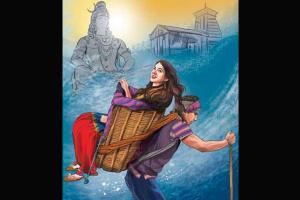There is growing 'cow vigilantism,' 'love jihad' and worse, often with impunity from the law.

Illustration/Uday Mohite
 Abhishek Kapoor's Kedarnath is impressive. When you consider how right-wing, fascist forces are taking over India, and taking the law into their own hands, it is remarkable how Bollywood is standing up to the goons. Since the Gujarat riots of 2002, when right-wingers massacred 790 Muslims, many more have been killed, including in the riots of Muzaffarnagar, and Pehlu Khan and Mohammad Akhlaq cases. Just last week, in Bulandshahr, UP, gau rakshaks shot dead a police inspector, Subodh Kumar Singh, and burnt down the police station.
Abhishek Kapoor's Kedarnath is impressive. When you consider how right-wing, fascist forces are taking over India, and taking the law into their own hands, it is remarkable how Bollywood is standing up to the goons. Since the Gujarat riots of 2002, when right-wingers massacred 790 Muslims, many more have been killed, including in the riots of Muzaffarnagar, and Pehlu Khan and Mohammad Akhlaq cases. Just last week, in Bulandshahr, UP, gau rakshaks shot dead a police inspector, Subodh Kumar Singh, and burnt down the police station.
ADVERTISEMENT
There is growing 'cow vigilantism,' 'love jihad' and worse, often with impunity from the law. In such a fraught atmosphere, it is extremely courageous for a Bollywood film to conscientiously call out communal politics, and underline India's long secular traditions, knowing the film will be vulnerable to pressure from politicians, the censor board, and Department of Hurt Sentiments blackmailers in court. (Both the Bombay High Court and Gujarat High Court dismissed pleas to ban the film, bravo!) So, first, a salute to Kedarnath, directed by Kapoor, and produced by Ronnie Screwvala and Kapoor.
Bollywood has a long history of celebrating Hindu-Muslim amity, and prioritising humanity above religion, from V Shantaram's Shejari/Padosi (1941), to Veer Zaara, Firaaq, Parzania, PK, Bombay, Jodhaa Akbar, My Name is Khan, Bajrangi Bhaijaan, Ek Tha Tiger, Bajirao Mastani, Mulk and Raazi, as well as Kapoor's own Kai Po Che! (2013), which addressed communalism in Gujarat. Mandakini or Mukku (Sara Ali Khan) is the daughter of a Hindu priest in the pilgrim town of Kedarnath, who falls in love with Mansoor (Sushant Singh Rajput), a Muslim porter, who carries pilgrims up the mountain on a chair on his back, or on his horse. He comfortably respects and shares the Hindu faith with the pilgrims, even as he does his namaaz.
Mukku pursues him aggressively — ulta love jihad, if at all — when he doesn't dare return her affections because of religious and socio-economic class differences. Her dad (Nitish Bhardwaj) is furious when he finds out, and says they will never be united, come hell or high water, and Mukku retorts that she will pray for just that. We know what happens next, as the film is set against the Uttarakhand tragedy of 2013, when an estimated 4,300 died and 70,000 went missing in flash floods. The romance, predictable in itself, is lent spunk by the feisty Khan, daughter of Saif Ali Khan and ex-wife Amrita Singh, who chews up the scenery in her debut feature. Rajput is a likeable, low-key foil, diffident because of his station.
There is a tender love scene in which he sings her the wistful song Lag ja gale (Embrace me) from the film Woh Kaun Thi. And a revolting one in which Mukku's father dunks her in the Mandakini river in a 'shuddhikaran' (purification) rite for falling in love with a Muslim. The story, by Kapoor and Kanika Dhillon, has screenplay and dialogue by Dhillon (Ra.One, Manmarziyan). The romance is layered with sibling rivalry, and a greedy Hindutvavadi suitor, who is keen to build more hotels in the fragile ecosystem. Tushar Kanti Ray's cinematography revels in the Himalayan setting, with a lot of drone shots. Kapoor, mercifully, doesn't go overboard with the computer graphics of the cloudburst and flash floods, which are very well done. Chandan Arora's editing of the predictable romance could have been a bit more taut.
Amit Trivedi's music is engaging, but nothing I'd remember afterwards. Kapoor's light touch on the communal issue is impressive in the film's best scene in the climax: Mansoor, the genteel, civilised, sacrificing Muslim, saves Hindus in the flood, including his potential father-in-law, who ruined his life. As he straps the man to a rope, to be rescued by a helicopter, while staying back and risking his own life, the older man tenderly holds Mansoor's shoulders for a moment half in gratitude, half in blessing. That one scene says everything about what Hindu-Muslim relations can be, without words, and is deeply moving. Next comes Screwvala's Uri: The Surgical Strike, in which Indians hammer Pakistanis. Sigh!
Meenakshi Shedde is South Asia Consultant to the Berlin Film Festival, award-winning critic, curator to festivals worldwide and journalist. Reach her at meenakshishedde@gmail.com.
Catch up on all the latest Crime, National, International and Hatke news here. Also download the new mid-day Android and iOS apps to get latest updates
 Subscribe today by clicking the link and stay updated with the latest news!" Click here!
Subscribe today by clicking the link and stay updated with the latest news!" Click here!






